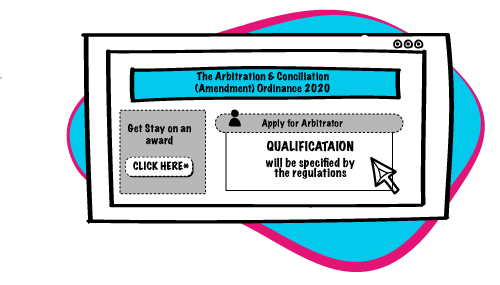The Arbitration and Conciliation (Amendment) Ordinance, 2020

On 4th November 2020, the Arbitration and Conciliation (Amendment) Ordinance 2020 was promulgated. This ordinance seeks to amend the Arbitration and Conciliation Act, 1996.
Now, the Arbitration and Conciliation Act 1996 was enacted to regulate the domestic/ international arbitration and conciliation proceedings. The Act was enacted in 1996 and amended for the first time in 2015. Thereafter, it was amended in 2019. The latest amendment Ordinance was promulgated recently this year.
Several sweeping amendment(s) were introduced in 2015 to make the arbitration expeditious and cost effective. To achieve this end, the role of Courts was clearly defined. Only High Courts (not district courts) had jurisdiction over international arbitration. As a result, time of Court was saved, and the arbitration process was faster. Further, the amendments imposed higher costs for initiating arbitration to prohibit any frivolous cases. Arbitrator(s) were asked to make declarations with respect to their independence. Responsibility was fixed on them for any delay from their end. The objective was to encourage self-discipline.
The Arbitration and Conciliation (Amendment) Act, 2019 was introduced to further the objective of exploring the arbitration option in a cost effective and time bound manner. To achieve this, the amendment suggested the establishment of Arbitration Council of India (ACI) consisting of Judge(s) of SC or HC, persons of eminent knowledge and experience in arbitration /conciliation proceedings. Besides the amendments brough in timelines within which the arbitral proceedings had to be heard and dispensed with. Arbitrary proceedings were also made confidential.
Now, the latest amendment in November 2020 seek to further streamline the processes and rationalize the procedure: A look at the key features of the Amendment Ordinance 2020:
- Stay on an award / order passed in an arbitration proceeding: the original 1996 Act allowed for any party to file an application to set aside an arbitration award / order. It was presumed to be automatic – the stay is automatically given on filing an application for setting aside the award/order. The 2015 amendment removed the automatic stay provision on mere filing of an application.Accordingly, where the Court is prima facie satisfied that (i) arbitration agreement or contract being the basis of the award; or (ii) the making of the award, was induced by fraud or corruption, it shall stay the award unconditionally pending disposal of the challenge against the award under Section 34 of the Arbitration Act. This proviso shall apply to all court cases arising out of or in relation to arbitral proceedings, irrespective of whether the arbitral or court proceedings were commenced prior to or after the commencement of the Arbitration and Conciliation (Amendment) Act, 2015.
- Section 43J which contains the eighth schedule and specifies the qualifications, experience and accreditation for arbitrators. The requirements under the schedule include that the arbitrator must be: (i) an advocate under the Advocates Act, 1961 with 10 years of experience, or (ii) an officer of the Indian Legal Service, among others. Further, the general norms applicable to arbitrators include that they must be conversant with the Constitution of India. The amendment 2020 has done away with these qualifications / experience. Consequently, Schedule 8 has been omitted. The amendment 2020 states that the qualifications and experience shall be governed / specified by Regulations. (However, the regulations have not been expressly stated in the amendments.)
The amendment 2020 is a mixed bag. Removing schedule 8 is ambiguous. Stating that qualifications and expertise of arbitrators will be governed by “regulations” without specifying such regulations is a grey area. However, the amendment allowing unconditional stay on awards induced on fraud or corruption is truly relevant and the need of the hour. Courts can now effectively deal with awards which are prima facie fraudulent or corrupt. The credibility of the arbitration / conciliation process and the award will remain intact.

